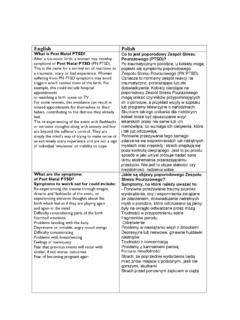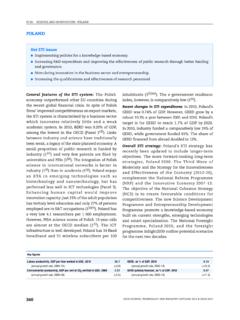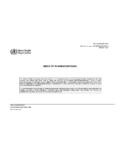Transcription of First to Fight: Threads of History - Poland in Exile
1 First TOFIGHTF irst to Fight: Threads of HistoryHEAD154 Memories which are still aliveColonel Stanis aw BerkietaIt came to me recently that seventy years have elapsedsince the start of World War II and that perhaps itwould be wise to put down on paper those memorieswhich are still alive and to share them with us as young men it was, of course, a great and atthe same time terrible adventure which changed ourlives forever. The difficult experiences that each of uswent through during the entire duration of the warwere, of course very different, depending on the placesand circumstances in which we found ourselves, andso, in order to prevent this turning into a large volume,I will describe the most important and the most memorable events that befell I was involved in the underground army in Warsaw, I felt quitedesperate because of the German occupation and so I came to the decision that,regardless of any dangers I might encounter on the way, I would endeavour toreach the polish Army which, at the time, was interned in Hungary.
2 And so, inApril 1940, I began my journey. However, fate was against me and, in May of thatyear, after crossing the artificial Soviet/German border in Przemy l, on the riverSan, Poland , I found myself in a Russian prison on the false charge of being spent nine months in two of the prisons, namely Przemy l, and then inStarobielsk, in the Ukraine. I was sentenced to five years of hard labour inKotlas. The conditions in the hard labour camp were utterly inhuman and thedaily food rations were determined by work quotas set by the camp authoritiesand impossible to achieve. The starvation rations led to malnutrition, givingprisoners the haunting appearance of walking cadavers. Thanks to the Sikorski-Maiski agreement, I only served nine the release of the polish prisoners of war from the prisons and labourcamps, General Anders began to assemble the First detachments in August 1941,which was when he gave his First order to the newly formed polish Army.
3 InMarch 1942, having overcome endless obstacles, I, too, finally succeeded injoining the polish Army, a section of which was being organised at that time inLugovaya, conditions in which the polish Army in Russia underwent its trainingwere exceptionally difficult: the lack of regular rations allocated by theRussians, problems with accommodation particularly during the long wintermonths when the temperature dropped to below -43oC, the absence of uniforms,the constant interference of the Russian authorities, but most significantly thelack of fighting equipment. All this made normal training impossible. Even we,as parachutists/commandos of Battalion S , did not possess anything related toour function, apart from the parachute practice tower which, however, wassomewhat useless without the necessary parachutes, which we never receivedprior to our departure from difficult negotiations with Stalin, General Anders secured theevacuation of the polish Army, and as many of the surviving polish families aspossible, out of Russia to Persia.
4 This took place between March and September1942. It must be said that, by this time, some of the detachments were close toresembling an army but not training, at long last, took place in Iraq with fighting equipmentsuch as tanks, armoured cars, means of communication etc., suitable formilitary operations. Our enemy called us the tourist army since, after leavingthe Soviet hell , we spent several weeks recuperating in Persia, after which wewere transferred to Iraq, then Palestine and finally to Egypt where, after a shortsojourn, we left to fight the Germans in war, for me, began with the Italian campaign after we arrived in TarantoonanEnglish passenger ship which had been adapted for the transportation oftroops. In Italy, we fought as part of the British 8th Army.
5 I was in charge of the3rd Platoon of the 4th Squadron, 15th Pozna ski Lancers Regiment, which wasassigned to the 5th Kresowa Infantry Division as the reconnaissance regiment. I participated in the entire action of the 2nd polish Corps, beginning with theBattle for Monte Cassino (11th-18th May, 1944), the bloody but victorious battle,after which we were in pursuit of the retreating German Army along the wholelength of the boot of Italy, including Loretto, Ancona etc, all the way to there, in December 1944, I was sent to Egypt as an interpreter in the BritishArmy Training centre situated in Abbasia, near the meantime, my regiment, the 15th Pozna ski Lancers, was transferredfrom Italy to Egypt. Therefore, when my term as interpreter on Abbasia came toan end, I was returned to my regiment, which subsequently was sent back toItaly in back in Italy, I commenced my engineering studies at the Institute ofTechnology in Fermo, studies which I took up again after my arrival in OFHISTORY155In September 1946, at the invitation of the British Government, the entirePolish Army left Italy and arrived in England, as political exiles.
6 The invitationfrom the Government was one thing; the reception by the British public wasanother. The dire economic situation in Britain after the war, with highunemployment and the rationing of practically everything, was not conducive tocreating a welcoming atmosphere. Notices with the words Poles go home ,together with the negative attitude of the press, did nothing to ease those earlypost-war years for us exiles in a foreign land, who had lost everything we hadfought for, while those around us celebrated their victory. As for the VictoryParade, at the insistence of Marshal Stalin, the polish Army was excluded fromparticipating. After several years of being fed with propaganda films (promoted by theBritish Government) heaping praise upon the communist ally, namely, Stalinand his regime in the Soviet Union, English people were unable to understandwhy we could not go back to Poland .
7 What we told them about the suffering wehad endured in the Soviet Union was often greeted with disbelief and treated asanti-Soviet propaganda. It was difficult to explain that Poles, particularly Polishofficers, could not go back to their own country for fear of being arrested uponarrival as being an enemy of the state, that is, the communist state imposed uponPoland by the Stalin regime. The punishment could be deportation, once again,to a prison in of the major problems we encountered in England was the attitude ofthe trade unions, which were so very pro-communist and anti- polish ; thisusually meant that only the worst kind of jobs were available to majority of polish soldiers and their families remained in England aspolitical exiles. Everyone had to go through the transition into Civvy Street andbecome independent and self-reliant, regardless of the post-war conditions.
8 Anorganisation was set up specifically for this purpose, known to the Poles as thePKPR (Polski Korpus Przysposobienia i Rozmieszczenia or the PolishResettlement Corps).I returned to my studies, financed in part by an army grant and partly bymeans of earnings from menial jobs, which helped me to support my family andto ensure that my children received a good education. Once my studies werecompleted, I was fortunate enough to find my successful career as an engineerwhich enabled me once more to see the world, as not only the war, but also mywork, took me to many interesting places I might not have otherwise constrains ofspace and time have prevented me from going intogreater detail about my war experiences and the many adventures they contain,I trust that others might like to share their memories in a similar vein.
9 First TOFIGHT156157 Telling TimesLieutenant Colonel Stanis aw Dmowski, by his childrenAdam Mickiewicz, the famous polish -Lithuanian poet,wrote a verse where he said that Poles were famous allover the world because they loved their country somuch that they were ready to leave it, to travel to theend of the world, to wander in poverty for many yearsand to fight and give their lives, if they had theslightest glimmer of hope that this might contribute toPoland s freedom and independence. The children ofLieutenant Colonel Stanis aw Dmowski wrote in hisobituary in 2002 that Adam Mickiewicz s verse sums upperfectly their father s was a trained army man graduating from the Officer Cadets Schools atRozan [R an? ] and Ostr w Mazowiecki in 1934 and already 30 years old whenthe Germans invaded Poland .
10 In the polish September Campaign of 1939 he wascommanding the 3rd Machine Gun Company of the 10th Infantry Regiment, partof the 26th Infantry On 6th September 1939, the Division was in thearea of Inowroc aw, where it was used in the Battle of The Bzura, covering theeastern wing of Pomorze Army. After the initial success of the polish offensive,the Division recaptured several locations, the Germans organized acounterattack in which the 26th was subsequently September 17th, wounded in both legs, Dmowski was taken prisoner andsent to a German hospital, from which he later escaped, as he had heard thatPolish Army units were being re-formed in France. Crossing the CarpathianMountains on foot and travelling further south through Hungary to Yugoslavia,he obtained passage to France with the assistance of the polish Consulate.






